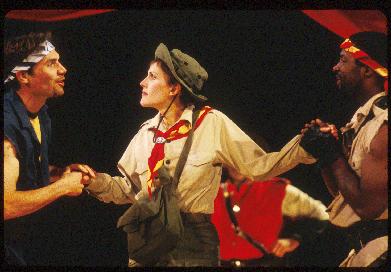
a word from our sponsors
Reviews
 |
 |
|
Ancient Britain meets Laugh In, part 2 |
|
A little farce goes a long way, however—especially when it's
as over the top as it is here—which is why this Cymbeline
starts to drag toward the end of the first half, just as Imogen
dons her mannish disguise, weighed down by a little too much directorial
jokiness overlaying the action. For example, Scheie overplays the attraction that various characters—including her brothers, the Roman general, and her father—each feel for Imogen as Fidele at first sight, presenting it as a bewitching effect of her pseudonym alone, aided by the nose-wiggling noise with which Samantha practiced her magic in (you guessed it) Bewitched. Alternatively, he makes it seem sniggeringly homoerotic at its core, rather than fueled by the presence of what is actually an beautiful woman in disguise.
This approach is of a piece with Steven Grenley's double-take as a Cage au Folles-ish Cornelius and Soothsayer, or the multiple encores Scheie gives to a streaking Posthumus—nudity and a few Pictish tattoos being the "silly habit" he dons in this production after he crosses over to the British resistance in Act V. Nor do the somewhat undersized TV screens that frame the stage provide very compelling background visuals, except in the case of Posthumus' famous dream, which as staged—or rather televised—here is worth the price of admission alone. Jupiter appears on the monitors as an animated creation straight out of South Park, with a large classic mask superimposed on what, from a distance, looked like a tiny cherub's body—more Sadaam Hussein than Satan, though with a most sonorous and stentorian voice. Strange to say, but Jupiter's uncredited voice gave perhaps the best performance of the play as a whole. Why? Simply because it achieved a much better approximation of the tone needed to get the most powerful effects out of Shakespeare's romances. While farce is not uncalled for, it needs to be less wink-wink joky, and retain more of a potentially serious edge, than Scheie allows his actors here. All the schematism and silliness that you can't avoid in staging a romance—without turning it into something else entirely, a lesser tragedy at best—must not completely undermine the communication at times of extreme, literally inhuman threats on the one hand, and the deepest, most humanizing of emotions on the other. Indeed, the schematic nature of the plot (and even, at times, the language) can actually intensify these effects by supplying the degree of distance we need to indulge them fully, yet with a kind of tranquility, without feeling engulfed or overwhelmed by the action. This was the secret of the unusual, and in my experience unprecedented, success of the Pericles presented at Ashland last season. The almost comic-book style of Shakespeare's first romance was preserved—no vain attempts to make the representation seem more 'realistic'—yet only to provide some distance on the more tawdry and troubling aspects of the plot, so they didn't distract too much from the deep emotional resonances this play proved entirely capable of generating. Who would guess such power lurked under the covers of a play that, today, typically ties with its successor Cymbeline as the least admired play in Shakespeare's cannon—though in Shakespeare's own lifetime, perhaps his greatest popular success. Given the similarities with contemporary romance novels, this kind of effect, together with its great popularity, might even define romance as a genre. Unfortunately, this Cymbeline doesn't have the confidence of that Pericles. Not trusting Shakespeare enough, Scheie puts too much of his slapstick self into the production, adulterating the effect. Yet as I noted in beginning, a little slapstick does seem entirely appropriate for this play, more so than for Pericles. Both plays cry out for their audience to indulge the fantasy of discovering Queen Elizabeth's body politic still alive some five years into the reign of her successor, and the political "family" she never quite had long-since waiting to be reunited. At the same time, Cymbeline in particular encourages them to vent the scorn they must have felt for James' impolitic attempt to unite his two kingdoms—presented in the political iconography of the time as an arranged marriage between his English daughter and her Scottish stepbrother, with Great Britain as their child—by laughing at the farcical representative of this project within the play, "oh where's his head?" Cloten. Even a little excess humor can't detract from the crescendo that builds recognition upon recognition in the final scene, though the silly little tone that Scheie uses to call attention to each one as it occurs does come close. Of course, we already know who everyone is and what they've been unaware of as it happened. The point is the characters get a chance to find out in front of us, and we also to be amazed at the wonderful complexity of plot and situation that's been set up for rapid recall at the close. Of the actors not yet mentioned, Susannah Schulman as Imogen has the quick intelligence needed to portray her as the strong interpreter of appearances she is, even if she sometimes gets it (as in the case of the headless Cloten) all wrong. Gary Armagnac makes for an engagingly arch and ironic Cymbeline, not the doddering old fool he's often reduced to. Andy Murray as Iachimo goes beyond the call of duty to present a finely nuanced realization that belongs in a better production, or perhaps an entirely different play. A word in closing on the seeming contempt with which Shakespeare Santa Cruz treats its single-performance ticket holders. On this notably idyllic campus, there must be a better place to put the non-subscribers line than on filthy stretch of blacktop. There must also be a better way of allocating the space inside the theater than to have us line up there an hour and a half early, and open the theater just 40 minutes before the performance starts, when most of the picnics we had brought were already eaten. My companion and I did have the presence of mind to rent a couple of plastic Adirondack chairs that had already been set up in semi-permanent rows in the Festival Glen for a dollar—a great improvement over previous years, when toward the end of the run the place had become a dust bowl. Why not go all the way and populate the entire glen with these chairs, making them into numbered, assigned seats—as already has been done for well-heeled sponsors? That way we all could enjoy a nice picnic on a our own private hillside somewhere before seating starts—not a depressing one in a parking lot. Cymbeline performed Saturday, June 29, 2000 at 8:00pm, presented by Shakespeare Santa Cruz. |
|
Copyright © 2000 Dana Spradley, Publisher. First
posted Sunday, August 6, 2000; last updated
.
|
|
|
